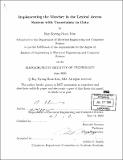Implementing the matcher in the lexical access system with uncertainty in data
Author(s)
Kim, Roy Kyung-Hoon, 1977-
DownloadFull printable version (5.842Mb)
Alternative title
Implementing matcher with uncertainty in data
Other Contributors
Massachusetts Institute of Technology. Dept. of Electrical Engineering and Computer Science.
Advisor
Kenneth Stevens.
Terms of use
Metadata
Show full item recordAbstract
The goal of this thesis is to modify the existing matcher of the lexical access system being developed at the Research Laboratory of Electronics so that it provides efficient and accurate results with limited segmental information. This information, provided by the speech signal processor, contains a set of sublexical units called segments and a set of features to characterize each of them. The nature of a feature is to describe a particular characteristic of a given segment. Previously the matching subsystem demanded a complete set of segments and features for each spoken word. Specifically, the speech signal processor was required to be without fault in its efforts to detect all available landmarks and cues and to convert them into the segmentally formatted data that the matcher recognizes. But this requirement for impeccability is nearly impossible to meet and must be relaxed for a real-world lexical access system. Overall, this new, modified matcher in the lexical access system represents a real-world application that anticipates and responds to imperfections in the given data. More specifically, the modified matcher has the ability to translate a series of segments with incomplete sets of features into possible utterances that the series may represent. With this new matcher, an experiment was performed to initiate a process to identify features with the most acoustic information. For a given set of incomplete segmental representations, the results of the experiment showed that the output of the matcher, or number of matched utterances, increases exponentially as the input of the matcher, or number of speaker-intended words, increases linearly. But as more features are defined in these incomplete representations, we can conclude from the results that the number of possible utterances becomes less exponential and more linear.
Description
Thesis (M.Eng.)--Massachusetts Institute of Technology, Dept. of Electrical Engineering and Computer Science, 2000. Includes bibliographical references (leaves 120-121).
Date issued
2000Department
Massachusetts Institute of Technology. Department of Electrical Engineering and Computer SciencePublisher
Massachusetts Institute of Technology
Keywords
Electrical Engineering and Computer Science.